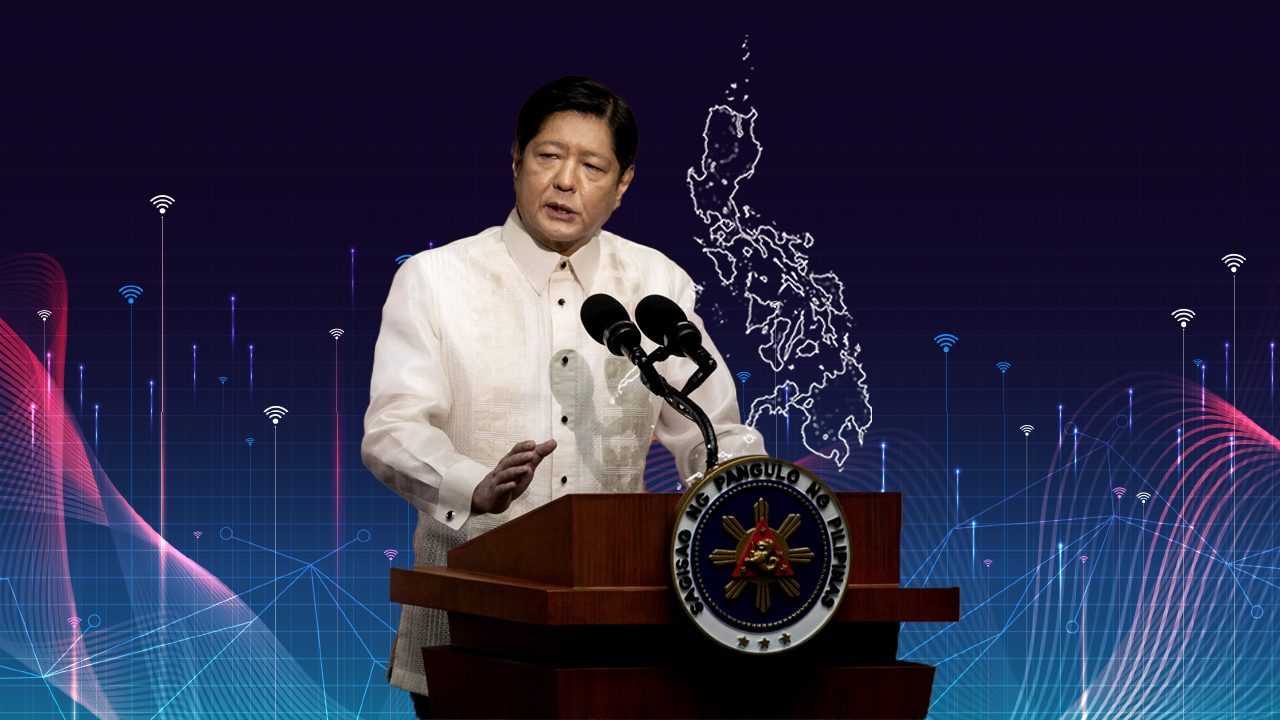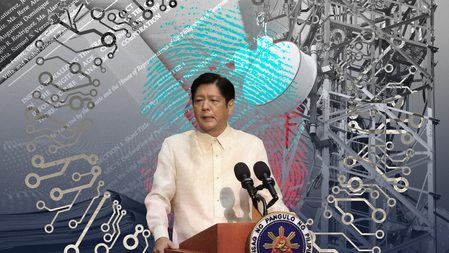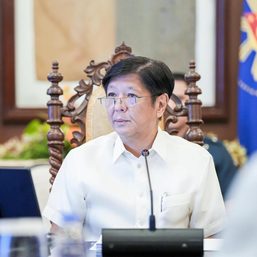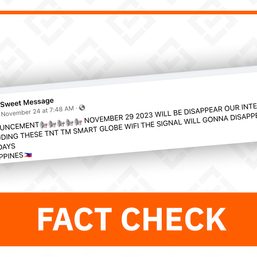SUMMARY
This is AI generated summarization, which may have errors. For context, always refer to the full article.

MANILA, Philippines – President Ferdinand Marcos Jr. touted increased digitalization, electronically-enhanced governance, and better internet speeds in the country as part of his State of the Nation Address on Monday, July 24.
Marcos said digitalization “will support the government’s data-driven and science-based planning and decision-making” and will aid in stamping out graft and corruption while increasing the government’s efficiency through streamlining efforts.
He added such digitalization would become notable “in the areas of government payments, company and business registrations, issuance of permits and licenses, loan applications, and revenue collection.”
Marcos cited one figure in this regard – that digital payments comprised 42% of total retail payments made by businesses, individuals, or the government in 2022 and that it was poised to reach Bangko Sentral’s target of 50% of total retail payments in 2023.
Related to digitalization and e-governance, Marcos also praised the development of the eGov PH application, meant to centralize and integrate key government services into a one-stop shop. To make e-governance easier, Marcos also touted his institution of the SIM registration act as the first bill he signed into law. He also praised the developments towards adoption of the national ID system, which fell slightly off the his hoped-for mark – while Marcos pushed for a target goal of 92 million IDs to be issued by mid-2023, July saw up to over 80 million registrants so far.
Despite missing a metric he had set, Marcos was hopeful, saying, “At 87% total registration, we are now closer to establishing a complete, accurate, and reliable digital database of our own for the entire population. This has already been integrated into the eGov PH app, and can be now accessed by our citizens.”
There was no mention of how the digitalization push would reach out to people without the money to afford online-capable smartphones and gadgets or the technical expertise to operate them.
Citing internet speed progress using Speedtest results
Marcos praised improvements in the country’s fixed and mobile internet speeds without citing the source of the data during his address.
Based on all current information available, the data he cited appears to have come from Ookla’s latest Speedtest.net results.
Said Marcos, “As of June of this year, our fixed broadband speed ranks 47th amongst 180 countries. This ranking is 11 places higher than it was in last year. Our mobile internet speed is now ranked at 83 out of 142 countries, which is 8 places higher than it was last year.”
Marcos promised future improvements, citing the availability of Elon Musk’s Starlink satellite broadband internet service as helpful for serving geographically isolated locales. He also mentioned the country’s National Fiber Backbone and Broadband ng Masa projects as being helpful in serving isolated and disadvantaged areas.
It can be recalled the DICT made at least two announcements in this regard, with a Broadband ng Masa tower announced in Marinduque in February and one in Antique in March.
Lastly, a lone ‘cybersecurity’ mention
There was no mention of how the government would take cybersecurity measures into account for this digitalization push.
Per the official transcript of the 2023 State of the Nation Address, cybersecurity was mentioned only once in the speech’s entirety, and not as a policy reminder.
Said Marcos as it related to SIM Registration Act, “The first bill that I signed into law was the SIM Registration Act because we are mindful of the risks and vulnerabilities that can lead to negative consequences. Digital users and consumers shall be protected from identity theft, phishing, other online scams, through essential systems and safeguards, such as cybersecurity, data privacy, consumer complaint mechanisms, and financial literacy campaigns.”
He did not elaborate. – Rappler.com
Add a comment
How does this make you feel?

![[In This Economy] Marcos’ POGO ban is popular, but will it work?](https://www.rappler.com/tachyon/2024/07/thought-leaders-marcos-pogo-ban.jpg?resize=257%2C257&crop=255px%2C0px%2C720px%2C720px)
![[Rappler Investigates] POGOs no-go as Typhoon Carina exits](https://www.rappler.com/tachyon/2024/07/newsletter-graphics-carina-pogo.jpg?resize=257%2C257&crop=424px%2C0px%2C1080px%2C1080px)







![[WATCH] #TheLeaderIWant: Filipino voters sound off on community issues a year before 2025 elections](https://www.rappler.com/tachyon/2024/05/filipino-voters-sound-off-on-community-issues-1.jpg?resize=257%2C257&crop=276px%2C0px%2C720px%2C720px)






![[Rappler’s Best] Knowing when to leave](https://www.rappler.com/tachyon/2024/07/biden-sara-gfx.jpg?resize=257%2C257&crop_strategy=attention)


![[Be The Good] Weave your story into the state of the nation](https://www.rappler.com/tachyon/2024/07/newsletter-marcos-sona-july-17-2024.jpg?resize=257%2C257&crop=275px%2C0px%2C720px%2C720px)
There are no comments yet. Add your comment to start the conversation.